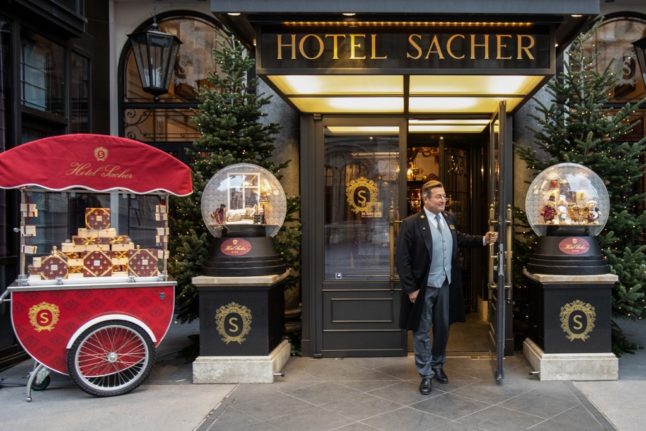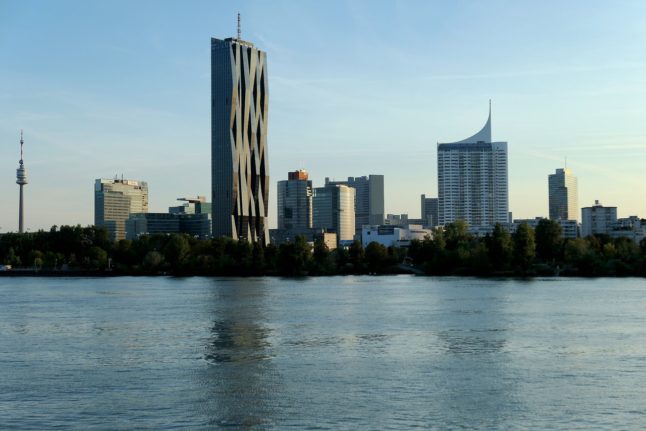The hotel's concierge, Uwe Kotzendorfer, is selling “Sacher Torte”, as the rich delicacy is known, on a drive-in stand just across the road from Vienna's prestigious State Opera house.
“I do a bit of everything now,” says Kotzendorfer, standing next to a small two-wheel cart stacked high with cakes, as he hands an imperial red bag containing one of them to a customer driving past in his BMW.
“I thought it was a fantastic idea,” says another customer, Claudia Bednar.
“Because we can no longer travel, I am going to send one to my aunt in Germany for her 65th wedding anniversary,” she explains, then pays for the cake, which typically costs between 50 and 60 euros ($60 to $71), with her credit card.

A hotel employee of the Hotel Sacher brings a Sacher cake to a customer in front of the entrance of the hotel in Vienna on November 25, 2020. ALEX HALADA / AFP
The vast majority of the Sacher's staff are now on government-subsidised furlough.
And the rooms and dining halls in the six neoclassical buildings — decorated with autographed images of previous guests such as Britain's Prince Charles, Franco-German film star Romy Schneider and US opera singer Jessye Norman — are deserted.
Nevertheless, the hotel insists on displaying fresh flower arrangements in honour of the five business travellers currently staying there.
For those parts of the hotel not currently occupied, the management is taking the opportunity to carry out some much-needed maintenance, and Kotzendorfer often guides workmen around the deserted swathes of the building.

A corridor with historical photos of famous guests of the Hotel Sacher is pictured in Vienna on November 25, 2020. ALEX HALADA / AFP
Past crises
According to owner and managing director Matthias Winkler, the Sacher is the last five-star hotel in Vienna that is still in family hands.
But it has survived a number of existential crises in the past and during the global economic crisis in 1934 event went bankrupt.
“We've gone through many trials since the creation of the brand and our family is still planning for the long term”, said Winkler, who took over the hotel from his mother-in-law in 2015.
The current coronavirus-induced economic downturn is also taking a heavy toll.
International travellers typically account for more than 90 percent of the hotel's annual 23,000 overnight stays, with rooms costing anything between 400 and 2,300 euros ($480-$2,700) per night in the low season.
However, with the coronavirus lockdowns, that source of income has now been all but wiped out.

The marble hall in the famous Hotel Sacher in Vienna is pictured on November 25, 2020. ALEX HALADA / AFP
Sacher's cakes, which are shipped and sold across the world, are helping keep the brand alive.
Although competition in the upscale hotel industry can be ruthless and international brands have larger financial resources, Winkler believes that being family-run is turning out to be an advantage during the pandemic.
“Here, decisions are made at a family meeting, without taking orders from abroad,” Winkler says.
Imperial cake
The Hotel Sacher and the Sacher Torte have a long history. In 1832, a young pastry chef called Franz Sacher was working on a new recipe he hoped would become all the rage at the Habsburg's imperial court.
The ingredients were whipped cream, a lot of cocoa, jam to add moisture, and a rich layer of chocolate frosting.

A collection of small “Sacher torte” are pictured in Vienna on November 25, 2020. ALEX HALADA / AFP
Forty-four years later, Sacher's son, Eduard, opened the hotel in Vienna's first district. But it was really only after Eduard's death in 1892 that the hotel enjoyed its glamorous heyday under the management of Eduard's widow, Anna Sacher.
As one of the first women to be allowed to own and run a business, the visionary matriarch become well-known for her wit.
The city's high society normally gathers for a dinner in the Sacher before the famous Opera Ball — but this year's event has fallen victim to the pandemic.

The entrance of the famous Hotel Sacher, November 25, 2020. ALEX HALADA / AFP
“A part of the history of Austria rests in our hands,” says the hotel's deputy director, Doris Schwarz.
“More than ever, it is a question of being up to the task,” she says, standing underneath an imposing portrait of Anna Sacher, a big cigar in her hand and two bulldogs at her feet.



 Please whitelist us to continue reading.
Please whitelist us to continue reading.
Member comments